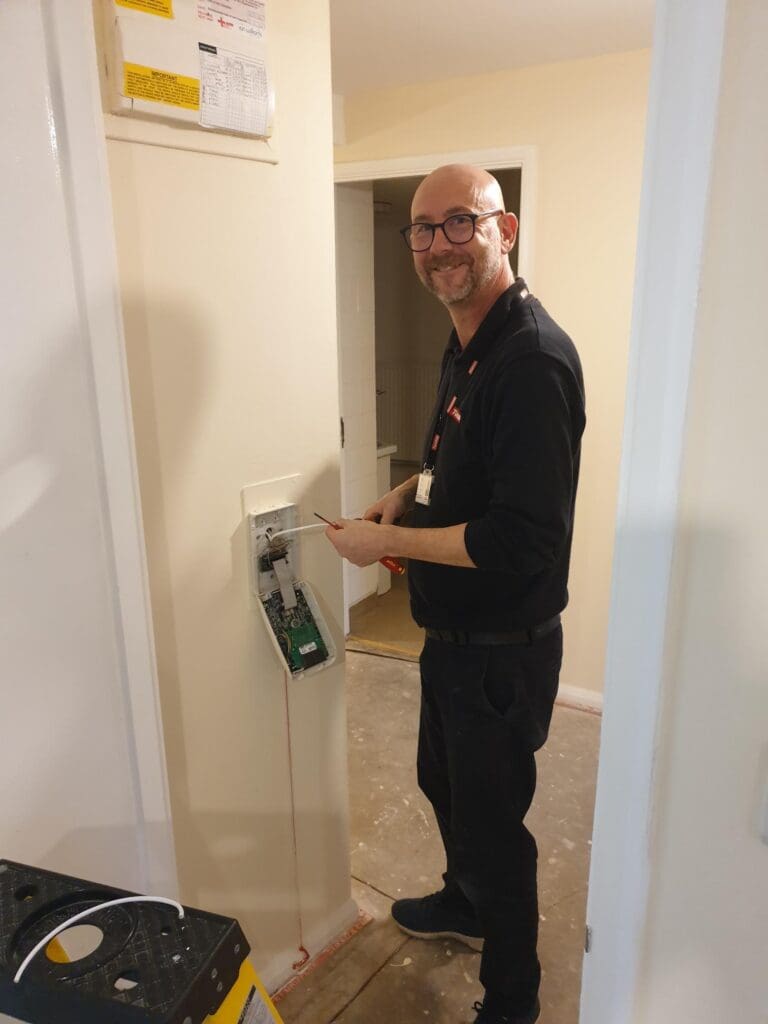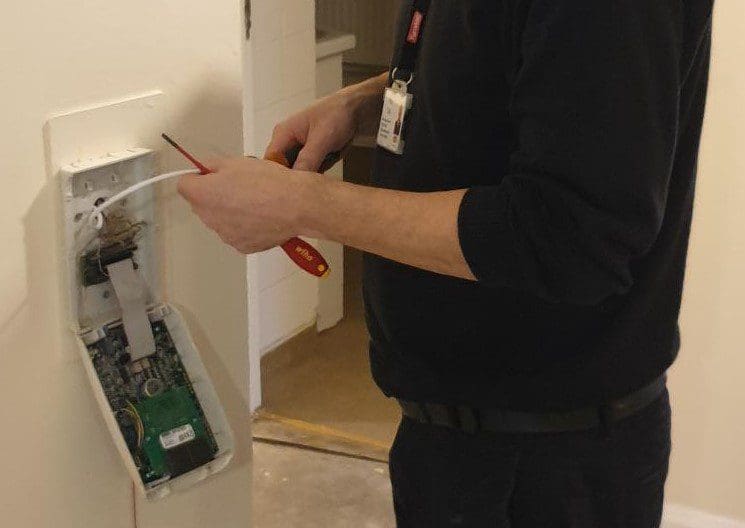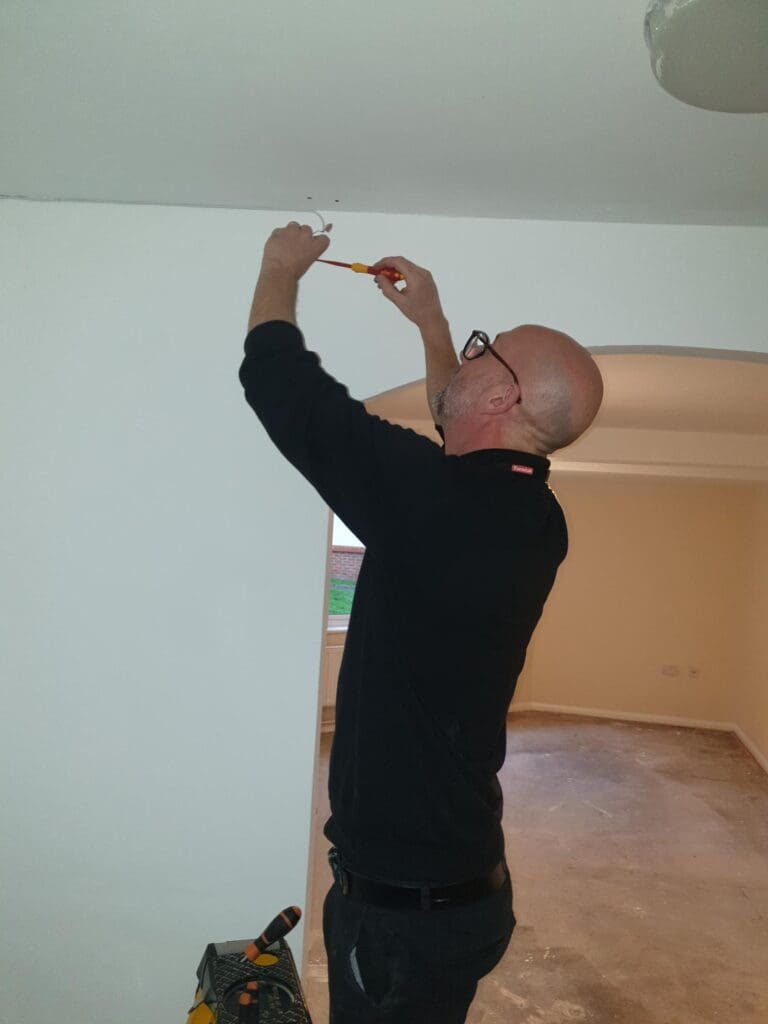A Field Service Engineer keeping people safe at home
Philip Cox works for Tunstall Healthcare as a Field Service Engineer.
Tunstall is a market-leading health and care technology provider. They provide lifesaving and life changing technology and services to millions of people in 18 different countries.
Philip Cox, Field Service Engineer, Tunstall Healthcare


Background
Have you always been interested in how things work and how to repair them?
Yes, when I was as young as ten, I would want to take apart anything electrical that was being thrown away. I have always been technically curious and decided very young I needed to know how everything worked.
I realise now that when I actually fixed something as a child, I would get great praise which encouraged me further.
Did you help with anything practical when you were a child?
Yes, if there was any chance to help an adult with something like fixing a fence, painting, or working on cars I would always volunteer.
Has there been a particular person who has been an inspiration or mentor to you?
Funnily enough it wasn’t until I started at Tunstall in 2003 where I met Paul Gorham and Dave Wood. Between them both they trained me from scratch, and I clearly remember saying to myself:
“I want to be a Paul Gorham or a Dave Wood”
because they were exactly how I wanted to be.
Working with as a field service engineer with healthcare products
You had been working as a telephone/CCTV engineer and so were already good at fault finding and dealing with customers. What attracted you to the healthcare industry?
I can’t really remember; it was 18 years ago!
I knew nothing of the products except that I had already repaired faulty telephone lines connected to Lifelines.
What in particular attracted you to Tunstall and their products?
Again, if I am totally honest it was the job itself, not the products specifically. At that time, I had just started a family and needed to get a job after being made redundant.
How long have you worked for Tunstall?
I’ve worked for them over the last 18 years but left and rejoined twice. This is not an unusual pattern at Tunstall.
During my first period of work with Tunstall, I got involved with training new engineers and realised that this was something I wanted to do.
The first time, I left and started working at Heathrow airport doing installs. I was interested in getting a different type of experience.
When I re-joined Tunstall, I switched from repairs and servicing to installation.
Airports tempted me again, and I joined Gatwick airport. Unfortunately, I was made redundant because of the Covid pandemic, and that’s when I joined Tunstall for the third time.
I’d always left on good terms and had a high opinion of the organisation, and so it was easy to re-join each time.


Typical day as a Field Service Engineer for Tunstall Healthcare
How much of the time are you on the road?
I’m on the road every day from Monday to Friday, and Saturday and Sunday too if I’m on call.
Can you give an overview of typical work you do?
The core duty of a service engineer is to respond to BRCs (break down callouts) usually with a 24hour SLA (service level agreement). Although some serious faults can be escalated by the customer to a 3- or 4-hour response time.
A typical day would be responding to a self-activating unit which could be either a speech module, smoke detector or pull cord.
There is always a steady stream of door entry or access control faults to get the grey matter working.
Typically, every fault I attend includes speaking face to face with either a scheme manager or resident.
What sort of engineering work do you do?
I fault find, repair or replace equipment. Also, I may move installed equipment or add extra equipment to an existing system. I do not install large systems as that’s carried out by contractors. Also, our vans aren’t set up for in-depth installation. However, sometimes I do install equipment if I can do it in the time available and it’s urgent.
Tools
What sort of tools do you have with you?
We carry all types of screwdrivers, side cutters, box spanners and security bits etc.
However, the most important tool that every engineer must have to fault find is a multi-meter. Without a multi-meter you are working blind as generally all the equipment we work on uses power, relays and data buses.
Ultimately every engineer’s toolbox is different because it depends what they used before in previous roles.
Are you always on your own?
I’m on my own for 95% of the time. Sometimes, there’s a two-person job needed. The other time I have someone with me is when I am training a new engineer.
Do you mind being watched when you are working?
No, I don’t mind at all and am comfortable with it. I do know that not everyone feels that way.
As long as you are confident that you have all the information that you need then being observed isn’t an issue.
What advice would you give to engineers who have to work while someone is chatting to them/asking questions?
My usual line of chatting is to ask the resident how long they have lived in the property and maybe where they lived before then. Residents like being asked about photos hanging up etc. I guess every grandparent or parent loves talking about their children.


Difficulties of the job as a healthcare field service engineer
What is the most difficult job type of work you have?
To be honest, I love technical mysteries. I like the challenge and the chase of solving the mystery of what is causing the fault.
I’m always happy to go and help other engineers when they have tricky problems. I love solving faults that no one else can.
Challenges
What are the main challenges you face?
There are challenges of four main types:
Lack of information
The biggest challenge I face is lack of information on site, even from new installations!
People handling
Sometimes I will attend a big fault which could be affecting many residents. In this case when you attend you can be surrounded by unhappy people. This can be quite challenging when you have several conversations coming from all directions and all you want to do is get to the controls and start working on the system.
Deciphering information
One skill parallel to being actually capable of fault finding is also the ability to decide when a person/or persons (all at once) are describing the fault and knowing what information is relevant or valuable; their perception can be quite different to what the system can actually do or is doing!
Lonely people
Visiting an old person with no one, that can be hard.
Hearing stories of someone telling me of their losses in their life. Life for many of our users is very sad, and there are so many lonely people out there.
Sometimes I may be the only person they have spoken to that day.
New engineers in healthcare field service engineering
Why would you recommend this type of engineering?
Our products provide reassurance not just to the people who have them, but also to their other family members – for example their sons and daughters who don’t live locally. It is a pleasure to be able to work in an industry which is making people’s lives better. That’s what attracts a lot of people to healthcare engineering.
This specific role gives me the opportunity to achieve several ‘wins’ in one day – every day. Solving and repairing faults and leaving a property or building knowing it is fixed gives me great satisfaction. Each fix is a ‘win’ and I like to get at least 6 wins a day. Some faults take a little longer but what a feeling when you crack it.
What sort of people are ideal for this work?
If you are technically curious with basic hand tool experience, computer experience and are a good communicator these are the building blocks of a great engineer.
Tenacious, curious, and great with people.
Training
When you are training a new engineer, how do you do it?
I first spend time training the new starter on how to use the system. You cannot expect a new starter to know how to fix a system if they do not know how to use it.
Once a general gist of the system is understood, it’s then diving right inside control cabinets, junction boxes, and laptop programming. Once something is explained I ask the new starter to say back to me what I have said, so I know it’s understood.
The key is repetition and getting used to handling the kit and specialist tools.
Involvement In Training
Why do you like being involved in training?
I am really passionate about people being given all the information, skills, and help they need to do the job well. If they are trained well and equipped in all ways, then they can feel confident, and be successful – and enjoy their work.
The way I see it, if a new engineer is going to succeed, he or she must feel supported all the way to the point of being an independent engineer not requiring constant technical help. That journey can take a couple of years and I do not want any of our engineers ever feeling abandoned on a large/difficult fault without support.
For example, if we allow new engineers to experience the terror of walking into a large building with loads of equipment that has failed without support from supervisors or experienced engineers. We run the risk of putting them through an awful experience that (if it occurs often enough) will undoubtedly lead to them leaving the business.
I simply can’t be part of that failure. That’s why I feel I have the right attitude and passion to give the best start for training new engineers.




Responses